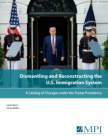Illegal Immigration & Interior Enforcement
Recent Activity

MPI's Kathleen Newland, Refugee Council USA's Mary Giovagnoli, and David Scott FitzGerald, author of Refuge beyond Reach, discuss how and why international and national responses to the rising challenge of refugee displacement are diverging.

Durante su primera visita oficial a Washington, DC, la Secretaria de Gobierno Olga Sánchez Cordero presento un discurso público sobre la nueva política migratoria de México en el Instituto de Políticas Migratorias.

On her first official trip to Washington, DC, Secretary of the Interior Olga Sánchez Cordero offered a public address on Mexico’s new approach to migration policy at MPI. Her remarks and the event discussion were mostly conducted in Spanish, and this recording is of the simultaneous English interpretation.

Convocamos un seminario en línea en la ocasión del lanzamiento del informe que describe donde se han radicado los migrantes venezolanos; las medidas que han utilizado los gobiernos latinoamericanos para regularizar el estatus legal de los migrantes venezolanos; y los esfuerzos por integrar a los recién llegados en sus nuevas comunidades de residencia.

With more than 3 million Venezuelans having fled their country in crisis, this event features the release of an MPI-OAS report that examines the creative responses that host countries in Latin America are providing.
Pages
Recent Activity
Los llamados de los activistas a "desbancar a la policía", a raíz de una serie de encuentros mortales para los miembros de la comunidad negra, hacen eco de las demandas anteriores de "abolir el ICE" y reflejar una crítica más amplia de los sistemas de aplicación percibidos como demasiado agresivo.





















Regional Processing Centers: Can This Key Component of the Post-Title 42 U.S. Strategy Work?